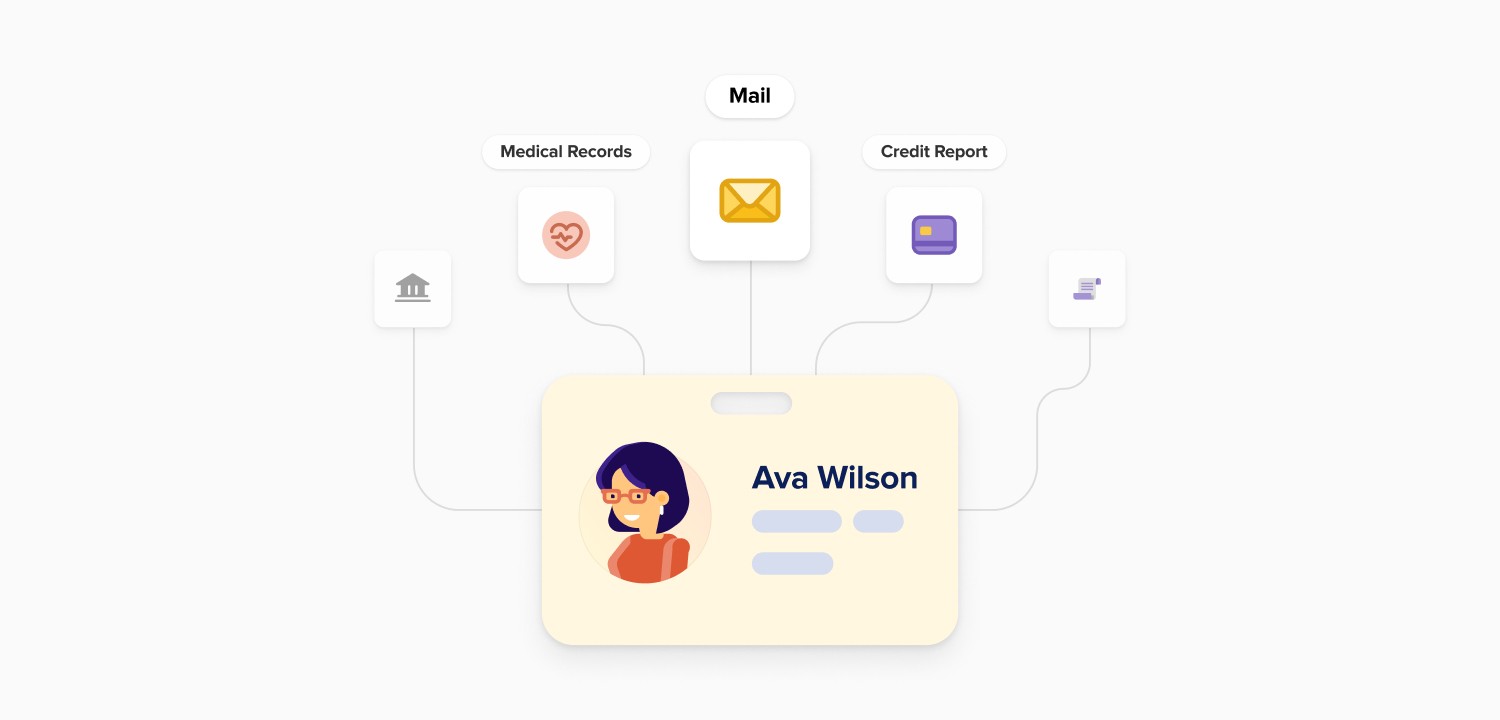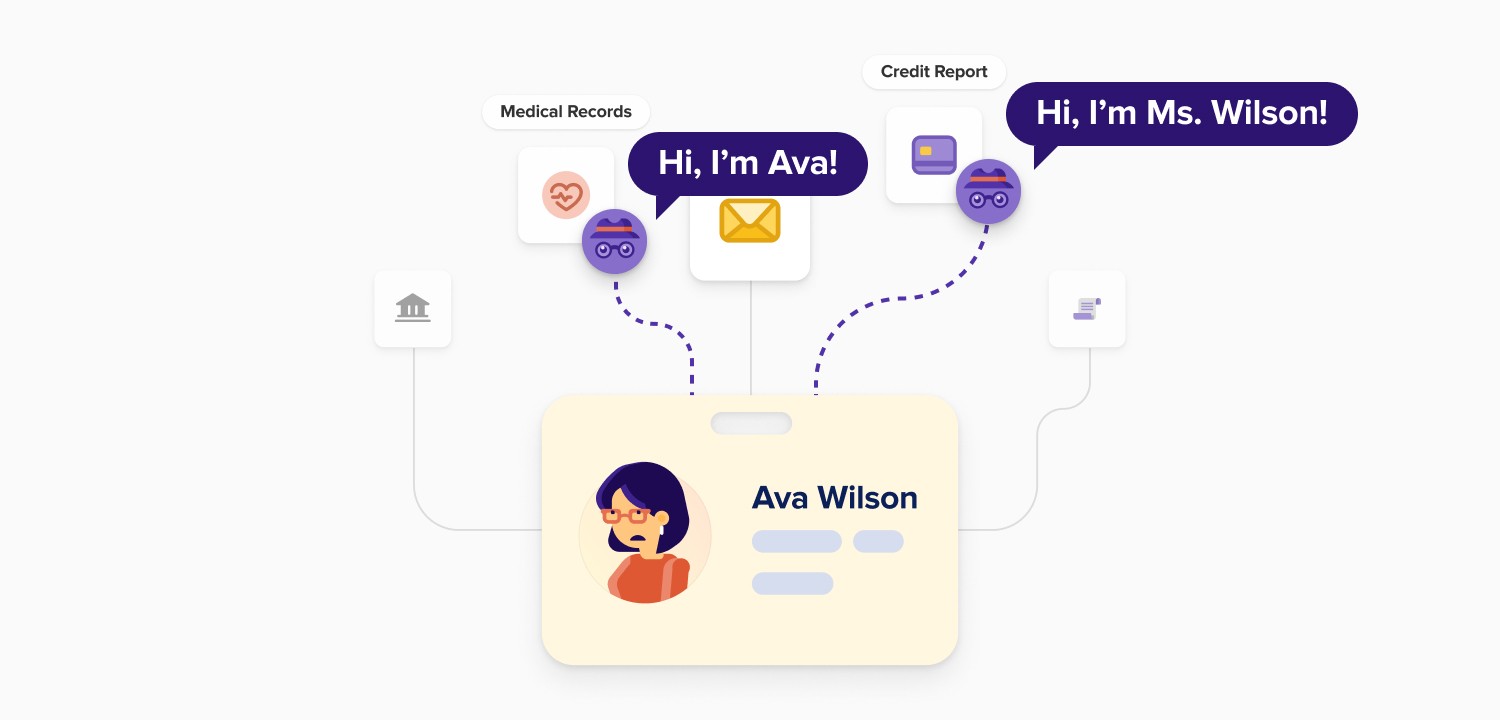
Types of Identity Theft
Identity theft can take many forms. Potential ramifications depend on the aims of bad actors and the personally identifiable information, or “PII,” that was compromised in the identity theft. However, some commonalities in identity theft can be identified.
Be on the lookout for these common types of identity theft:
- Credit line identity theft: Identity thieves can use information like your date of birth and Social Security number to apply for credit cards, loans, and other lines of credit.
- Synthetic identity theft: Bad actors can mix your actual information with fabricated details to forge a “synthetic” identity, in other words, a person who doesn’t really exist. Identity thieves can then use those fake identities to open fraudulent accounts and make purchases.
- Medical identity theft: Your personally identifiable information can be exploited to unlawfully obtain medical services under your name.
- Tax identity theft: With a target’s Social Security number, identity thieves can commit tax fraud to steal your tax refund.
- Employment identity theft: Perpetrators can use your identity to gain employment, which can impact your credit, benefit capabilities, and taxes, as well as creating extensive potential legal issues down the road.
- Unemployment identity theft: Bad actors can claim and intercept your government benefits.
Common Identity Theft Warning Signs
How do you know if your identity is compromised? Keep an eye out for these identity theft warning signs – and act immediately if you notice any of them!
- Unfamiliar charges on credit card or bank statements. If you see purchases you don’t recognize, investigate! They may be unauthorized transactions.
- Missing bills, bank statements, or other paper mail. Identity thieves will sometimes submit change-of-address requests to intercept victims’ mail. Follow up if you notice you’re not receiving your usual mail.
- Unexpected credit denials. If you generally maintain a good credit standing but have been unexpectedly denied when applying for a credit card or loan, it could indicate that your credit has been damaged by fraudulent financial activity.
- Unknown accounts on your credit report. See a credit card or loan you don’t recognize when checking your credit report? It could indicate fraud.
- Collection calls for unknown debts. If you’re getting phone calls from debt collectors about a debt you don’t recognize, it could be a clue that someone fraudulently incurred that debt using your identity.
Did you notice one or more of these warning signs in your finances? Read What To Do if Your Identity Is Stolen below for tips on what to do next.
What Is Identity Theft Protection?
The term “identity theft protection” covers a range of proactive measures you can take to help safeguard your personal and financial information from unauthorized access and fraud.
The best identity theft protection practices can include:
- Regular monitoring of financial accounts and credit reports to spot suspicious activity early on.
- Increasing security by using secure passwords, enabling two-factor authentication (2FA) when available, and storing personal documents in a safe location.
- Taking immediate action (like placing fraud alerts, freezing your credit, etc.) to prevent new fraudulent accounts from being opened.
We discuss all the above and more in our guide How to Prevent Identity Theft: 8 Best Identity Theft Protection Tips
Why Is It Important To Have Identity Theft Protection?
When it comes to guarding against identity theft, good habits go a long way. Protecting your identity can help mitigate financial loss. If this happens, catching identity theft attempts early can protect your credit standing by stopping fraudsters before they do significant damage.
Proactively protecting your identity can reduce the time, effort, and potential cost involved in disrupting fraud and recovering from identity theft. Improving your security measures — both online and offline! — can also reduce your vulnerability to phishing, hacking, and other identity theft methods.
Keep your peace of mind by establishing a strong defense against the increasing threat of identity theft.

What To Do if Your Identity Is Stolen
If you discover that your identity has been compromised, it’s important to act quickly.
In the US, you should alert your banks, credit card issuers, the Federal Trade Commission (FTC), and the three major credit bureaus (Equifax, Experian, and TransUnion) right away to minimize damage.
You’ll also want to change the passwords to any secure online accounts that may have been compromised.
Finally, keep detailed records of any communications related to the identity theft incident for legal purposes. This can include phone calls and emails with financial institutions, law enforcement, and more. You may not need it all, but it’s better to be prepared.
How To Report Identity Theft
As soon as you realize you’ve been the victim of identity theft, consider taking these steps:
- Report it to the FTC via their consumer website, IdentityTheft.gov, or by calling their hotline at 1-877-438-4338.
- Notify the fraud departments of the three major credit bureaus (Equifax, Experian, and TransUnion) to place fraud alerts on your credit reports.
- File a report with the police department. This creates an official record of the identity theft, which is sometimes required by financial institutions during the recovery process.
Note: Contact your local police precinct for guidance on how to file a police report for identity theft. Police departments typically have dedicated phone numbers for non-emergency situations, and that’s what you’ll want to use in most cases.
How To Put a Freeze on Your Credit Report
Did you notice some suspicious activity? Contact each of the three major credit bureaus to request a credit freeze, effectively preventing any new credit accounts from being opened in your name. Freezing your credit is free and can be lifted at any time using a PIN or password provided by the relevant credit bureaus.
Just remember that while a credit freeze offers strong protection against fraud, it will require some management, such as temporarily lifting the freeze when you’re applying for credit yourself.
Consider an Identity Theft Recovery Service
Identity theft is complicated, and it’s always evolving, so you may want to consider signing up for a reputable identity theft recovery service. These services specialize in guiding identity theft victims through the recovery process. Some also offer legal and financial assistance.
Shopping around for a service? Look for services that offer direct assistance with disputing fraudulent charges and accounts, as well as helping restore your credit. You might also consider plans that cover out-of-pocket costs related to identity theft recovery, which can be considered additional financial protection.
This article is for informational purposes only.
Prior versions on GitHub.